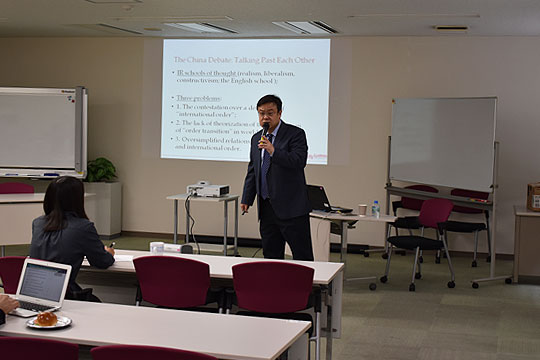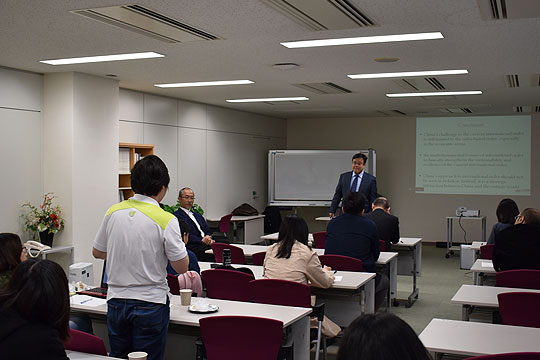On October 31, Professor Kai He from Australia’s Griffith University gave a presentation as part of the Ritsumeikan Center for Asia Pacific Studies (RCAPS) Onigiri Seminar series. Entitled “Rethinking China and International Order: A Conceptual Analysis,” The seminar was chaired by Professor Yoichiro Sato, Dean of APU’s International Cooperation and Research Division (ICRD).
Professor He’s research topic stems from the pre-existing debate on whether China should be classified as a “Revisionist State” or a “Status Quo State.” The former school of thought argues that China will challenge the current international order while the latter contends that China has no reason to overthrow the current state or develop a new order due to the benefits, particularly the economic benefits, it presently reaps. As both arguments are supported by strong evidence, it has sparked a fierce, never-ending and controversial debate amongst scholars in the field.
In order to shed light on how scholars should comprehend China’s relationship with the international order, Professor He has developed a framework. This framework considers the economic, political, and security aspects of China on a norm-based level, power-based level, and rules-based level.
At the end of his presentation, Professor He concluded that while China can challenge some elements of the current international order, it does not have the intention or ability to overthrow it entirely. Furthermore, China’s approach to the international order should not be perceived in isolation. It is fundamental for scholars to also analyze China's interactions with other countries as these interactions will shape China’s future course of action, thereby affecting its role in the international order.
This seminar’s popularity among International Relations majors was rather apparent during the question-and-answer session. Many of them asked Professor He for his opinion and evaluation of China’s international policies such as the One Belt and One Road policy, the contentious South China Sea Policy, as well as China’s involvement in the Asian Infrastructure Investment Bank (AIIB).
APU’s Research Center for Asia Pacific Studies (RCAPS) facilitates seminars that are designed to inspire research on the Asia Pacific region by APU faculty members and graduate students. The Onigiri Seminar series is unique in that onigiri (Japanese rice balls) and other light snacks and drinks are usually served during the seminar. This is partly to encourage faculty members and students to engage in further discussion with the speaker after the presentation. All students and faculty members are welcome to attend these seminars for free.












